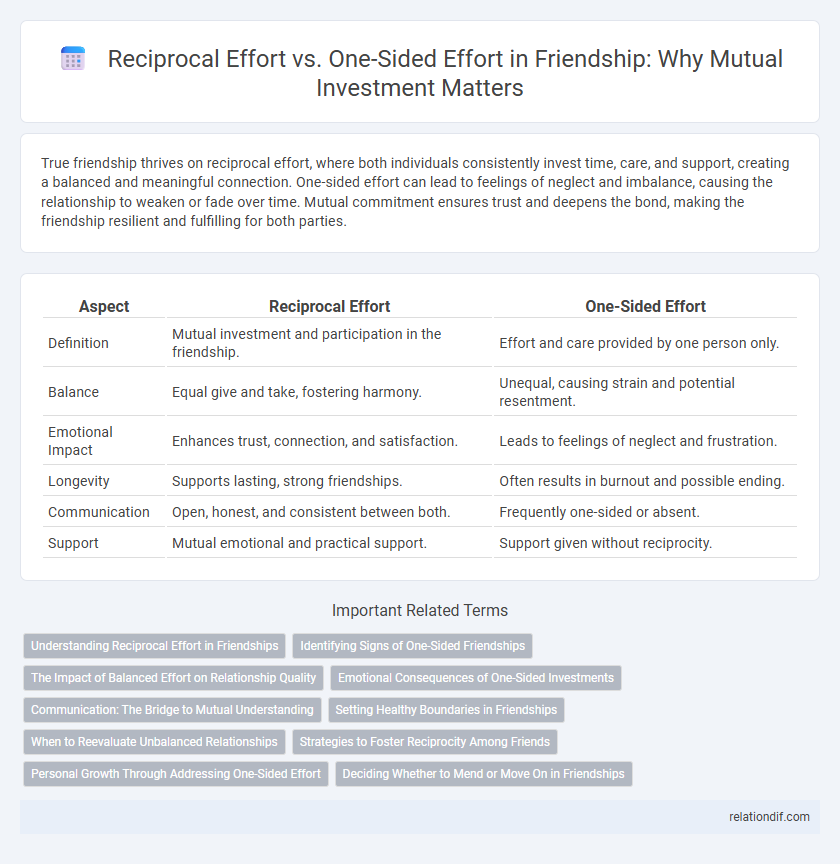True friendship thrives on reciprocal effort, where both individuals consistently invest time, care, and support, creating a balanced and meaningful connection. One-sided effort can lead to feelings of neglect and imbalance, causing the relationship to weaken or fade over time. Mutual commitment ensures trust and deepens the bond, making the friendship resilient and fulfilling for both parties.
Table of Comparison
| Aspect | Reciprocal Effort | One-Sided Effort |
|---|---|---|
| Definition | Mutual investment and participation in the friendship. | Effort and care provided by one person only. |
| Balance | Equal give and take, fostering harmony. | Unequal, causing strain and potential resentment. |
| Emotional Impact | Enhances trust, connection, and satisfaction. | Leads to feelings of neglect and frustration. |
| Longevity | Supports lasting, strong friendships. | Often results in burnout and possible ending. |
| Communication | Open, honest, and consistent between both. | Frequently one-sided or absent. |
| Support | Mutual emotional and practical support. | Support given without reciprocity. |
Understanding Reciprocal Effort in Friendships
Reciprocal effort in friendships involves mutual understanding, shared responsibilities, and balanced emotional support, which strengthens the bond over time. One-sided effort often leads to imbalance, resulting in feelings of neglect and emotional strain. Recognizing and nurturing reciprocal effort ensures healthier, more resilient relationships built on trust and respect.
Identifying Signs of One-Sided Friendships
One-sided friendships often reveal themselves through consistent imbalance in effort, where only one person initiates contact, plans activities, or offers support. Signs include feeling emotionally drained, lack of mutual interest in sharing life updates, and unreturned favors or messages. Recognizing these patterns helps preserve emotional well-being and encourages seeking more balanced and fulfilling connections.
The Impact of Balanced Effort on Relationship Quality
Balanced effort in friendship significantly improves relationship quality by fostering mutual trust, respect, and emotional support. When both parties engage equally, communication becomes more open and conflicts are resolved more effectively, leading to deeper connections. One-sided effort often results in feelings of resentment and emotional exhaustion, ultimately weakening the bond between friends.
Emotional Consequences of One-Sided Investments
One-sided effort in friendship often leads to feelings of frustration, resentment, and emotional exhaustion for the person investing more. The imbalance can cause decreased self-esteem and a sense of undervaluation, impacting overall mental well-being. Sustainable friendships thrive on reciprocal emotional support, ensuring mutual satisfaction and trust.
Communication: The Bridge to Mutual Understanding
Effective communication serves as the bridge to mutual understanding in friendships, ensuring reciprocal effort rather than one-sided investment. When both friends actively listen and express themselves openly, trust and empathy strengthen the bond. This balanced exchange prevents misunderstandings and fosters a supportive, enduring relationship.
Setting Healthy Boundaries in Friendships
Setting healthy boundaries in friendships requires recognizing the importance of reciprocal effort, where both parties actively contribute to the relationship's growth and emotional support. One-sided effort often leads to imbalance, emotional exhaustion, and resentment, highlighting the necessity of clear communication about needs and limits. Establishing boundaries ensures mutual respect, fosters trust, and maintains the friendship's long-term health and sustainability.
When to Reevaluate Unbalanced Relationships
Unbalanced friendships where one person consistently invests more time and energy often lead to emotional exhaustion and dissatisfaction. Reevaluate the relationship when feelings of neglect or resentment arise, especially if attempts to address the imbalance are met with indifference. Prioritizing mutual respect and effort ensures healthier, sustainable connections that foster genuine support and trust.
Strategies to Foster Reciprocity Among Friends
Cultivating mutual support in friendships requires open communication and consistent acts of kindness that encourage balanced exchanges between friends. Setting clear expectations and regularly checking in on each other's needs fosters a sense of shared responsibility and emotional investment. Prioritizing empathy and active listening strengthens trust, ensuring both parties feel valued and motivated to contribute equally.
Personal Growth Through Addressing One-Sided Effort
Personal growth often emerges when individuals recognize and address one-sided effort in friendships, prompting self-reflection on boundaries and emotional investment. By confronting imbalanced dynamics, people develop stronger communication skills and increased emotional resilience, which fosters healthier relationships. This process encourages greater self-awareness and empowers individuals to prioritize mutual respect and support in future interactions.
Deciding Whether to Mend or Move On in Friendships
Reciprocal effort in friendships reflects mutual respect, understanding, and shared emotional investment, which fosters trust and deeper connections. One-sided effort often leads to imbalance, emotional drain, and growing resentment, signaling the need to evaluate the friendship's sustainability. Deciding whether to mend or move on requires assessing the potential for genuine change and mutual commitment versus accepting the emotional toll of continued one-sided dynamics.
Reciprocal effort vs One-sided effort Infographic

 relationdif.com
relationdif.com